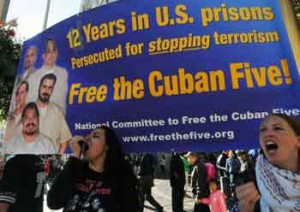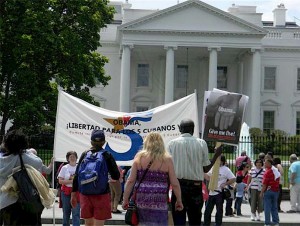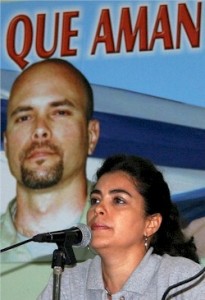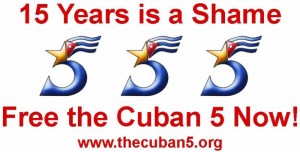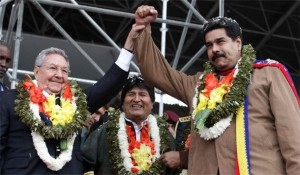By W. T. Whitney Jr.
General John Kelly heads the U.S. Southern Command. As such he directs military operations throughout Latin America and the Caribbean and wages war against drug trafficking and associated crime in Honduras. Kelly’s visit to Tegucigalpa on June 2 meant so much to Honduran President Juan Orlando Hernández that Kelly got to attend a session of Honduras’ Council of Defense and National Security .
Kelly announced that, “the work that this government has undertaken [against drug trafficking] in these last months is incredible.†He lauded Honduras’ new policy of extraditing accused drug offenders to the United States. Hernández characterized Kelly is a “great friend of Honduras†and observed that his police and soldiers take encouragement from Kelly’s kind words.
Honduras’ role as a transfer point for drugs heading north and a murder epidemic there blamed on drug-related crime serve as rationale for U.S. military intervention. Honduras’ murder rate is the world’s highest. A congressional report indicated that as of February 3013, the United States had provided $163 million in military and police assistance over three years; $58.2 million more were anticipated during the then current year. The U.S. military operates three naval bases in Honduras. Its large Palmerola Air Base supports long distance flights.
But U.S. crime fighting in Honduras is not all that it seems. Police, soldiers, and paramilitaries, for example, are killing children, many of whom are engaged in criminal activities instigated by adults. The Casa Alianza children’s rights group reported that between January 1 and March 30, 2014, 270 persons less than 23 years of age were murdered. That group’s director José Guadalupe Ruelas declared on television on May 5 that, “one million Honduran children are not in school, 330,000 child laborers are being exploited, and every year 8000 children leave the country without an adult, fleeing violence.” Yet on May 9, “military police … savagely beat” and detained Ruelas.
Killings may have little to do with drug transactions. On May 4, for example, murderers hit a human rights activist and community leader in San Pedro Sula . On May 12 gunfire wounded a Tegucigalpa councilman who was an opposition activist. The next day armed men killed an agrarian rights activist in Baja Aguan. On May 16, someone shot and killed the popular mayor of Iriona. On May 22 in La Ceiba shots from a passing vehicle killed a taxi driver and two passengers, one a prison guard. Assailants there that day killed a forestry engineer who reported illegal logging. On May 28 in Copán department, a radio journalist and human rights defender was killed. On May 10, heavily armed men broke into the house in Yoro Department where eight Cuban doctors on a solidarity mission were living. The intruders handcuffed, beat and threatened to kill the physicians.
And in May Congressperson Jan Schakowsky’s (D-IL) widened the U. S. discussion on violence in Honduras. Her letter to Secretary of State John Kerry, signed by 108 colleagues, urged the “State Department to use its leverage to urge the Honduran government to protect the fundamental human rights of its citizens, end the use of military forces for law enforcement, investigate and prosecute abuses.”
A military coup removed populist President Jose Manuel Zelaya on June 28, 2009. Violence and social turmoil wracking Honduras since then suggest politics are at work. Conditions worsened after January 27, 2014 when right wing President Hernández took office.
Poverty in Honduras is 60 percent, and productive land is concentrated in very few hands. Defending establishment interests, the Liberal and National Parties have controlled Honduran politics for decades. Oligarchs arranged for Zelaya’s ouster, something U.S. Ambassador Hugo Lorens knew about beforehand. U.S. military and intelligence operatives had allegedly communicated with perpetrators . The plane taking Zelaya to exile in Costa Rica stopped en route at the U.S. Palmerola Air Base.
Formed after the coup, the National Front for Popular Resistance (FNRP) resisted, first in the streets and then though its new LIBRE political party. Campaigning for a constituent assembly and social justice, the mildly socialist Libre Party backed Xiomara Castro as its presidential candidate. She had led in polls prior to the November, 2013 election, widely regarded as fraudulent. National Party candidate Hernández won by eight percentage points.
The pre-election killing of 18 LIBRE activists followed murders of opposition activists, unionists, teachers, and students ongoing since 2009. Now, according to a police whistleblower, “Summary executions have increased [while] public security is being totally militarized and the military now controls several institutions civilians should direct … A] blank check [exists] for repression of the political and social opposition, criminalization and prosecution of protest, and violation of human rights.”
The atmosphere is toxic. On May 14 the National Party president of Honduras’ Congress used police to expel all 37 LIBRE Party congressional deputies. Security forces used tear gas, pepper spray, and batons. The deputies had wanted to debate agrarian reform, corruption, and model cities – the previous government’s plan for privately-governed havens for corporations. Television showed police carrying away ex-President Zelaya, now a congressman and head of LIBRE Party’s parliamentary bench.
Agrarian rights activists face danger, especially in Baja Aguan where African palm plantations and palm oil processing facilities are centered. On May 21, 315 soldiers, police, and 40 private security operatives expelled small farmers occupying two plantations; they wounded two and arrested 14. That scenario has recurred often throughout the region for several years. Although legislation in the 1980’s and Zelaya-era regulations later on made land available to peasants, agribusiness impresarios, notably Dinant Corporation owner Miguel Facussé, usurped large tracts. Between 2010 and 2013, public and private security forces killed 102 small farmers who resisted.
The Committee for Free Expression indicated recently that 173 journalists, teachers, judicial personnel, and human rights advocates were assaulted in 2013, with state security forces carrying out half the attacks; there were 11 murders. Between January 2010 and July 2013, 36 journalists or “social communicators” were killed.
U.S. mainstream media pay little attention to violence in Honduras. Nevertheless, Rep. Schakowsky and her colleagues took a stand: they urged Secretary of State Kerry to “fully enforce the Leahy Law, which prohibits assistance to individuals or units of any foreign military or police body that commit gross human rights abuses with impunity.â€
Yet General John Kelly takes that legal requirement, and presumably his civilian overseers, with a grain of salt. Testifying before a congressional committee on April 29, he complained that the Leahy Law sometimes interferes with the Southern Command mission. Because of that, Kelly uses Colombian soldiers rather than his own.
“When we ask them to go somewhere else and train the Mexicans, the Hondurans, the Guatemalans, the Panamanians, they will do it almost without asking … It’s important for them to go,” he explained, “because I’m – at least on the military side – restricted from working with some of these countries because of limitations … based on past sins. And I’ll let it go at that.”
General Kelly may have been thinking of the new “TIGRES” militarized police formation established by President Hernández for “direct combat with transnational organized crime.” U.S. military advisors worked with Colombia’s “Jungle School” (Escuela de Selva) to train TIGRES recruits.




